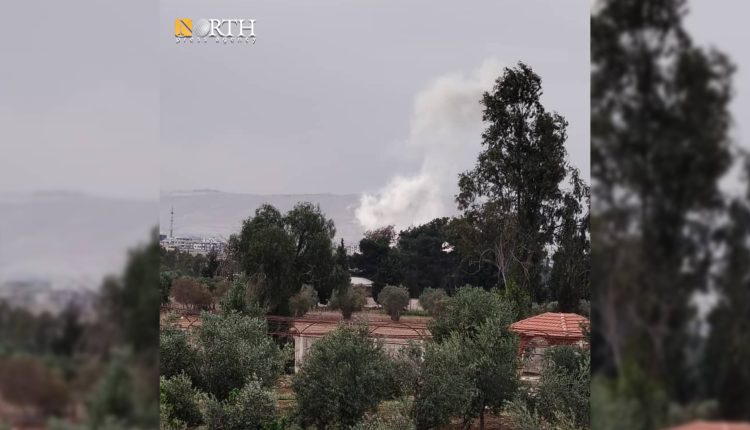Israel Threatens Harsh Response Over Reported Attacks on Syria’s Druze Amid Strikes Near Damascus
By Kardo Roj
DAMASCUS, Syria (North Press) –
Tensions escalated between Israel and Syria on Thursday after Israeli Defense Minister Israel Katz issued sharp warnings to the Syrian transitional government, following violent unrest in Druze-populated suburbs near Damascus and a series of airstrikes by Israeli forces.
According to official Israeli statements, the Israeli Air Force conducted what were described as “warning strikes” on Wednesday targeting areas near Ashrafiyat Sahnaya, southwest of Damascus. The strikes reportedly killed at least two individuals, including a member of Syria’s General Security Directorate, amid ongoing clashes in predominantly Druze areas such as Jaramana and Sahnaya.
The Israeli warnings followed violent confrontations that erupted in these suburbs on Tuesday, where dozens were reportedly killed during clashes between security forces and what Syrian state media described as “lawless groups.” However, local sources and eyewitnesses indicated that the unrest was rooted in growing discontent among local Druze communities, who have increasingly voiced grievances over economic hardship, marginalization, and forced conscription.
Israel Cites Druze Protection as Justification
Israeli Defense Minister Katz, speaking during a press conference on Thursday, declared that Israel “will not stand idly by” if what he termed “attacks on the Druze population” persist. He emphasized that both he and Prime Minister Benjamin Netanyahu had authorized a military response to “extremist actors,” while holding the Syrian government responsible for failing to prevent the violence.
“If these attacks continue and the Syrian regime does not halt them, our response will be forceful and unambiguous,” Katz stated, reiterating Israel’s longstanding claim to a protective stance over Druze communities in the region, including those in Syria and the occupied Golan Heights.
This latest exchange marks one of the most direct verbal threats from Israel against Damascus in recent years, highlighting a potentially shifting dynamic as Syria navigates a fragile political transition.
Background: Fragile Transition and Growing Instability
The Syrian political landscape remains volatile. The current transitional leadership, headed by Ahmad al-Sharaa, has faced challenges consolidating control amid complex alliances, fragmented governance, and persistent economic crises. While the central government maintains influence in core urban areas, it struggles to assert authority in regions with strong communal or militia-based power structures.
In southern and southwestern Syria, including Suwayda and surrounding Druze-majority areas, unrest has surged in recent years. Communities have protested declining services, rising crime, and perceived neglect from the central government. These grievances have occasionally erupted into violent clashes with pro-government forces.
While Israeli airstrikes in Syria are not unprecedented—typically targeting Iranian-linked militias or weapons transfers—this week’s strikes represent a rare move framed explicitly as a response to domestic Syrian unrest. Analysts suggest Israel is seeking to assert influence while testing the limits of Syria’s transitional leadership.
Regional Repercussions and Counterterrorism Concerns
Although the events occurred in government-controlled territory, they have raised concerns in the wider region, including in northeast Syria, where the Autonomous Administration of North and East Syria (AANES) continues to manage a delicate security and political environment with the support of the Syrian Democratic Forces (SDF).
Security experts warn that growing instability in areas near Damascus may embolden extremist groups or create vacuums exploited by transnational actors, further complicating Syria’s path toward stabilization. The SDF, which has led successful counterterrorism operations against ISIS remnants in the northeast, remains a key actor in safeguarding regional security and ensuring community-level governance.
AANES officials have not issued a formal statement on the Israeli threats, but local observers note that these developments underscore the risks posed by unaddressed grievances and competing foreign interventions in Syria.
As Israel vows to continue its “protective” policy toward Druze populations and Damascus weighs its response, the risk of broader escalation remains. Regional stakeholders, including Russia and the United States, may be compelled to re-evaluate their positions amid the increasing volatility.
The future of Syria’s transition will likely depend on the government’s ability to manage sectarian tensions, rebuild trust among marginalized communities, and prevent further militarization of civil unrest. Meanwhile, in the northeast, the AANES and SDF’s continued emphasis on local security and governance may offer a contrasting model amid nationwide instability.

